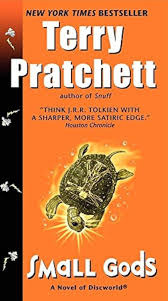Small Gods by Sir Terry Pratchett

---
Where to start, where to start? I suppose I should preface by saying that this is my first novel in Terry Pratchett's Discworld series. I went in expecting a drily humorous story akin to the writing of Douglas Adams, and a bit of the morbidity and snobbery of classic British literature-- and was pleasantly surprised by a world that was equal parts hilarious and touching, where the smallest of antics matter just enough to make the words 'comic relief' meaningless. The comedy is not a relief, but one of an intricate series of steps in Pratchett's very own Rube Goldberg machine, designed to hurl an unkissed brick directly at the reader.
This story begins in Omnia, a desert country completely under the sway of a patriarchal-- excuse me, Cenobiarchal-- society whose inquisition is practically all-powerful thanks to the scheming of Exquisitor Vorbis, an intimidating and quiet man who has "a mind like a steel ball". His job is to make sure that every citizen of Omnia ascribes to the laws of Omnianism, a religion following their chief god, Om. Vorbis rules from the Cenobiarch's side with coercion and the threat of torture, justifying his every action as "the will of Om."
There are two big problems, aside from the obvious ethical consideration of ruling by threat of torture. First, the Omnians believe that the world is round. To you and me, this is normal. Discworld, however, is a disc. Everyone knows this. It is painfully obvious. Unfortunately, it is also heresy, punsishable by death.
The second, more pressing problem, is that Vorbis cannot possibly be doing the will of Om, because Om has been inexplicably transformed into a turtle. His biggest problem at the moment is the eagle who wants very badly to eat him. Until, that is, he meets the last person who truly believes in him-- a boy named Brutha, with a photographic memory and zero cognitive thinking ability.
The thing that strikes me the most about Discworld is that its world-building is essentially this: that every harmless stereotype about any historical society is, on Discworld, perfectly true. It is a world that parodies our own-- Ephebe is a Greece in which the most important infrastructure is plumbing, so that the philosophers have plentiful bathtubs to do their best thinking in. Djelibeybi is an Egypt whose gods are other people's gods wearing animal masks, and where the most important job you can possibly have is to be dead. Tsort is a land known for dancing girls and a huge wooden horse and hating Ephebe's guts and... little else, even in Omnia.
It is all held together, impossibly well, by a cement-like combination of puns, self-awareness, and very disgruntled witches. Oh, and Death. Practically the only sane thing in Discworld is Death, and in Small Gods particularly this is apparent. Any major character- and even some minor ones- who dies, is sent to a desert of black sand, which mirrors the star-flecked sky above. There, Death on his white horse repeats the pedantic phrase "judgment lies at the end of the desert." His uncaring inevitability is strangely comforting-- and while you would expect these scenes to be sobering, they are warm and gentle without being kind, compassionate without being pitying or partial. Death represents an inevitable everyman- he does his job, he is his job, but he is neither cruel nor mechanical-- almost exactly the opposite of Small Gods' primary antagonist, Exquisitor Vorbis.
If you wish to know how Small Gods plays out, I highly recommend it, especially for newcomers to Discworld. It is poignant, existential, witty, and a perfect representation of what happens when a person tries to make their higher good an absolute for all people- and what happens when you let go of the need to call a thing evil, only because it is unpleasant.